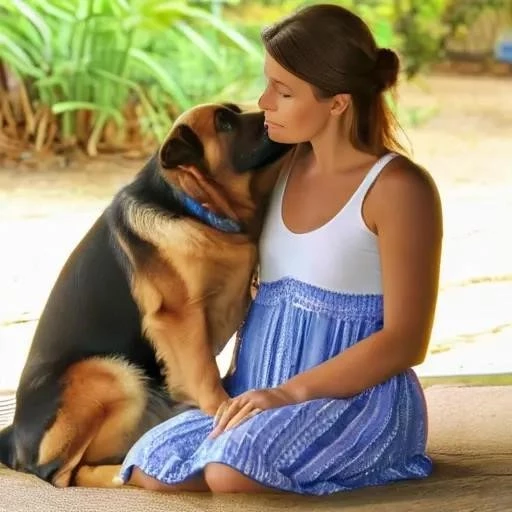Beyond the Bark: How One Woman’s Journey Tamed the ‘Mad Dog’ and Unlocked the Secrets of Canine Rehabilitation
The tale of an aggressive dog often begins with despair‚ a gnawing fear that a beloved companion might be beyond help. Many owners‚ facing growling‚ lunging‚ and snapping‚ grapple with the heart-wrenching decision of rehoming or‚ tragically‚ euthanasia. Yet‚ amidst these challenging narratives‚ a powerful undercurrent of hope is emerging. This is the story of transformation‚ a testament to the profound potential within every canine‚ even those labeled “mad‚” and the remarkable human dedication that can unlock it. It’s a journey that challenges preconceived notions‚ proving that even the most formidable aggressive behaviors can be meticulously rehabilitated‚ leading to harmonious co-existence and unbreakable bonds.
Dog aggression‚ as experts at VCA Animal Hospitals meticulously explain‚ is a multifaceted issue‚ rarely a simple personality flaw. It stems from a spectrum of underlying causes‚ including conflict aggression‚ fear-based or defensive reactions‚ possessive tendencies over resources‚ food guarding‚ and redirected aggression. Understanding these root causes is the crucial first step toward effective intervention‚ moving beyond mere symptom management to address the core of the problem. This nuanced perspective‚ championed by leading dog behaviorists‚ underscores that aggression isn’t a fixed trait but often a coping mechanism‚ a distressed animal’s way of communicating fear‚ discomfort‚ or insecurity in a world that feels overwhelming. By dissecting these complex behaviors‚ rehabilitation specialists can craft targeted strategies‚ offering a beacon of hope where once only frustration resided.
| Key Insights into Dog Aggression & Rehabilitation | |
|---|---|
| Common Causes of Aggression | Conflict‚ fear-based‚ defensive‚ possessive‚ food guarding‚ and redirected aggression are frequently observed triggers. |
| Rehabilitation Philosophy | Requires a thoughtful‚ customized approach‚ often integrating positive reinforcement and behavior modification beyond traditional training. |
| Hope for Abused Dogs | Even dogs with aggression stemming from long-term abuse can be rehabilitated and learn to trust again‚ though it demands significant time and patience. |
| Critical Success Factors | Seeking professional help (behaviorists‚ specialized trainers)‚ understanding the aggression’s root causes‚ consistent application of training‚ and unwavering owner commitment. |
| Prevalence & Impact | Aggression is the most common reason pet parents seek professional help and a leading cause for surrender or euthanasia. |
| Reference for Further Reading | VCA Animal Hospitals: Dog Aggression |
The journey of rehabilitating an aggressive dog is akin to untangling a deeply knotted rope‚ requiring patience‚ expertise‚ and an unwavering belief in the animal’s capacity for change. As dog behaviorists like those at Bevill Dog Behavior emphasize‚ addressing aggression demands an approach that transcends conventional dog training‚ delving into the psychological underpinnings of canine behavior. This often means implementing customized‚ positive reinforcement-based programs‚ which DW Dog Training highlights as incredibly effective in significantly improving aggressive rescue dogs’ chances of living harmoniously in their forever homes. The transformation isn’t instantaneous; it’s a gradual‚ often challenging process‚ punctuated by small victories and occasional setbacks‚ yet ultimately profoundly rewarding.
Consider the inspiring accounts of owners who have transformed their “mad dogs” into cherished companions. These stories often begin with a moment of crisis – a bite‚ a terrifying lunge‚ or an unmanageable outburst – pushing owners to the brink. Yet‚ instead of giving up‚ they sought out the specialized knowledge of professionals. As various experts and anecdotal evidence from forums like Quora suggest‚ even dogs with aggression rooted in severe abuse and trauma can be rehabilitated. The key lies in identifying the right professional – a behaviorist or trainer specializing in aggression – who can decipher the dog’s unique communication and develop a tailored behavior modification plan. This process often involves teaching self-control‚ building trust‚ and creating an environment where the dog feels safe and understood‚ gradually replacing reactive behaviors with calm‚ confident responses.
The future of canine welfare is undeniably bright‚ illuminated by pioneering research and dedicated professionals who refuse to label any dog as irredeemable. Organizations like The Kramer Foundation are actively retraining and placing formerly at-risk dogs‚ demonstrating the widespread success of rehabilitation programs. By integrating AI-driven insights into behavioral patterns and refining positive reinforcement techniques‚ specialists are continually enhancing their ability to tackle even the most entrenched aggression issues. This forward-looking approach‚ focusing on understanding and empathy rather than punishment‚ is not just transforming individual dogs; it’s reshaping our entire relationship with our canine companions‚ fostering a more compassionate and informed society. The message is clear: hope is not lost‚ and with the right support‚ virtually any “mad dog” can find its path to peace and become a loyal‚ loving member of the family.

